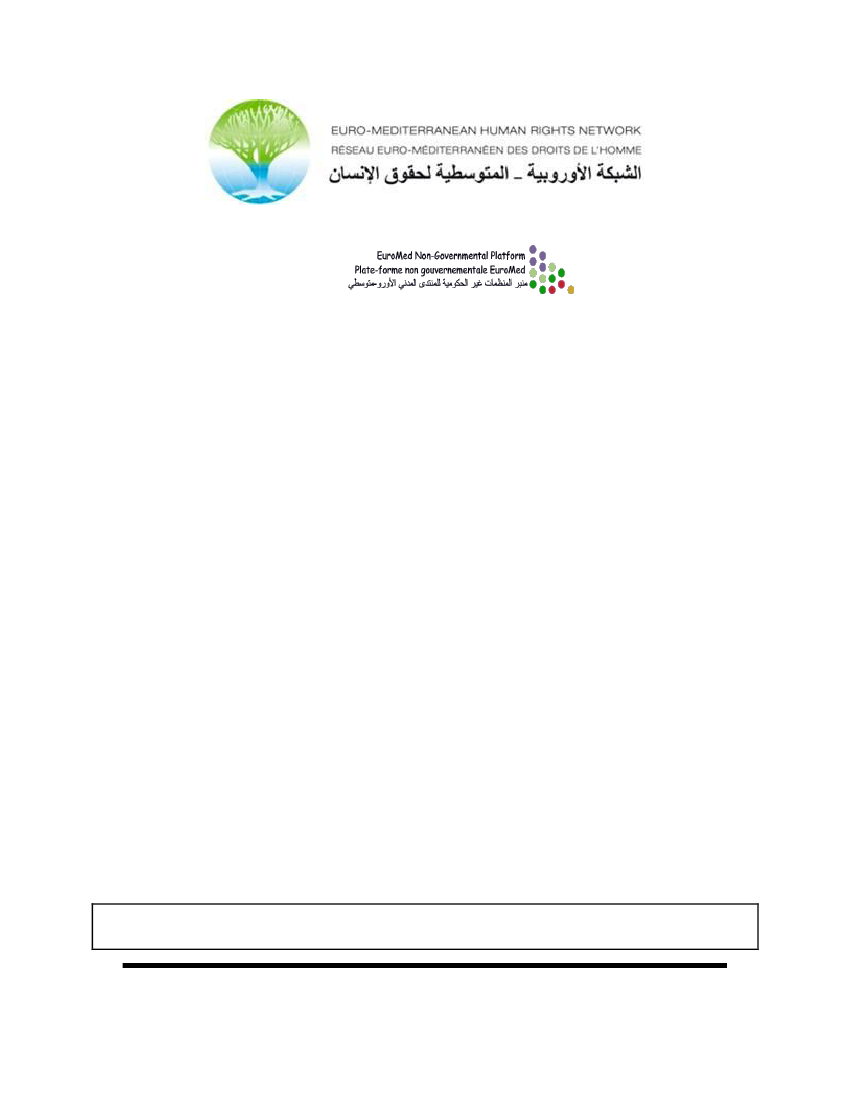Udenrigsudvalget 2012-13, Ligestillingsudvalget 2012-13
URU Alm.del Bilag 192, LIU Alm.del Bilag 70
Offentligt



6 June 2013Memorandum in view of theThird ministerial meeting of the Union for the Mediterranean (UfM)On strengthening the role of women in society scheduled in Paris on 12 September 20131. The Euro-Mediterranean Human Rights network (EMHRN) and the Euromed Non-GovernmentalPlatform (ENGP) welcome all initiatives, regional and national, aimed at strengthening the role ofwomen in society, protecting and promoting women’s rights and women’s equal participation withmen in political, economic and cultural life.2. The EMHRN and the ENGP welcome all the measures to install gender equality in order to combat allforms of discrimination against women in accordance with the UfM Conclusions of the MinisterialConference in March in November 20093. The EMHRN and ENGP were active and coordinated civil society initiatives and inputs to the first andsecond ministerial meetings in Istanbul and Marrakech in 2006 and 2009.4. Since then the EMHRN and ENGP closely followed the situation on the ground with their membersand warmly welcomed the revolutionary moments in the Maghreb and Middle East countries thatbrought hopes for freedom, equality and democracy. They also praised the crucial role played bywomen in the revolutions.5. In 2011-2012, the EMHRN facilitated in depth national discussions and actions on women’s rightsand gender equality through meetings held in Algeria, Egypt, Jordan, Lebanon, Morocco, and Tunisiaas well as with Syrian women’s rights activists fighting oppression.6. On this ground, the EMHRN and ENGP are deeply concerned about the deteriorating situation ofwomen's rights in countries going through transitional processes.7. A worsened security environment, patriarchal practices and conservative politico-religious views,accompanied by austere economic measures, have led to serious women's rights violations andTheEMHRN(Euro-Mediterranean Human Rights Network) gathers more than 80 human rights organizations, institutions andindividuals based in 30 countries around the Mediterranean. It works to promote and protect human rights within the framework ofthe Barcelona Process and the co-operation between the European Union and the Arab world.
Euro-Mediterranean Human Rights Network. Vestergade 14-16, 2 floor. DK-1456 Copenhagen KFax: +45 32 64 17 01 سكاف + 45 32 64 17 00 نوفيلت
nd
8.
9.
10.
11.12.
13.
14.
weakened gender equality. For example, gender-based sexual violence is used as a weapon of war inSyria and cases of sexual violence committed with total impunity have been regularly reported inseveral countries of the region. Parliamentary quota was abolished in Egypt, reducing women’srepresentation in lower house from 12% to 1.5%. Intense brutality was used against womenpracticing their rights to peaceful assembly and to express their opinion in several southerncountries. Many women in Europe suffer greater precariousness due to economic austeritymeasures, which is coupled with the rise of movements whose policies are harmful to women’srights.The EMHRN and ENGP notice at the same time, that the political situation in the region is highlyvolatile. Suffice it to mention that the Syrian regime is currently bombing and killing its own people,the legislative assemblies in Tunisia, Egypt and Libya have yet to find their shape, parliamentaryelections in Lebanon have been postponed to 2014, Israel is continuing the expansion of illegalsettlement, etc.The EMHRN and ENGP are, however, ready to support activities that can lead to a better situationfor women, human rights and democracy in the EuroMed region and to contribute to thestrengthening of civil society activities in this field.In this relation, the EMHRN and ENGP regret that no implementation mechanisms for theMarrakech Conclusions were established at regional level and that the conclusions were nottranslated into national action plans. Our organisations call for the setting up of such a mechanism.The EMHRN and ENGP strongly suggest that the Third Ministerial meeting by no means shouldweaken the conclusions of the Istanbul and Marrakech meetings.Ministers should reiterate their commitment to promote de jure and de facto equality between menand women and to respect the civil, political, economic, social and cultural rights of women as wellas men, as defined by the international human rights instruments, in particular the Convention onthe Elimination of All Forms of Discrimination against Women (CEDAW).In this regard, the EMHRN and ENGP stress the importance of freedom of association and theindependence of civil society as invariable principles for women’s rights organisations to fulfil theirmission. Restriction on these freedoms, including in relation to funding of organisations, areinadmissible.The Ministers should agree on an Action Plan leading to:a) Ensuring gender equality and non-discrimination based on sex as set forth in article 2 of theUniversal Declaration of Human Rights and article 26 of the International Covenant on Civil andPolitical Rights;b) Combating gender-based violence through adopting and implementing laws against genderbased violence, including sexual harassment and laws for protection from domestic violence;
TheEMHRN(Euro-Mediterranean Human Rights Network) gathers more than 80 human rights organizations, institutions andindividuals based in 30 countries around the Mediterranean. It works to promote and protect human rights within the framework ofthe Barcelona Process and the co-operation between the European Union and the Arab world.
Euro-Mediterranean Human Rights Network. Vestergade 14-16, 2 floor. DK-1456 Copenhagen KFax: +45 32 64 17 01 سكاف + 45 32 64 17 00 نوفيلت
nd
c) Developing and reforming judicial systems ensuring their independence and impartiality and thefull and equal access of women to these;d) Ensuring women’s participation in political, civil, economic and public lifeinter aliaby agreeingon mandatory quotas as a means for promoting their participation;e) Abolishing discriminatory articles in personal status law, penal code and others;f) Guarantee freedom of association for organisations and their free access to funding.15. The Action Plan should define specific objectives, activities, timeframes, benchmarks and indicatorsand assignments of responsibilities.16. Projects within this framework should include support to:i.Civil society actions to lift reservations to the CEDAW and abolish discriminatory articles inpersonal status law, penal code and others;ii.A regional observatory on violence against women with a program to rehabilitate victims ofsexual violence, and a regional initiative to end impunity for violence against women inlegislation and practice;iii.Legal aid programmes support to women ensuring their equal access to courts and non-discrimination by these;iv.Projects to support women’s equal economic, social and cultural rights, in particular their rightto work and to education.17. Furthermore, independent Euro-Med civil society organisations including women’s rightsorganisations should be closely involved and consulted in relation to the preparations and theoutcome of the Paris Ministerial meeting. Representatives of these should be invited to attend theMinisterial meeting in Paris and offered space to convey their analysis and recommendations.
TheEMHRN(Euro-Mediterranean Human Rights Network) gathers more than 80 human rights organizations, institutions andindividuals based in 30 countries around the Mediterranean. It works to promote and protect human rights within the framework ofthe Barcelona Process and the co-operation between the European Union and the Arab world.
Euro-Mediterranean Human Rights Network. Vestergade 14-16, 2 floor. DK-1456 Copenhagen KFax: +45 32 64 17 01 سكاف + 45 32 64 17 00 نوفيلت
nd



